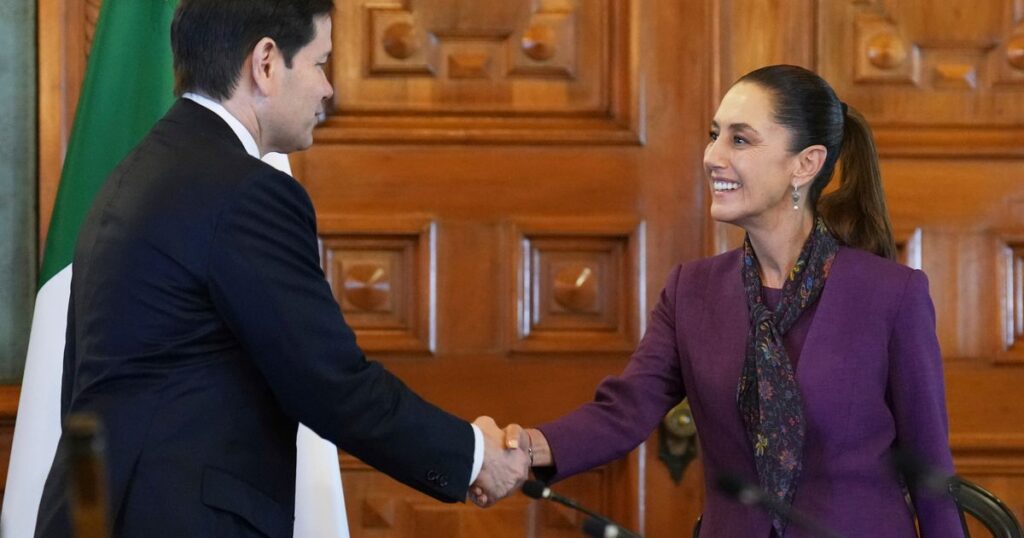MEXICO CITY (AP) — Mexican President Claudia Sheinbaum’ s strategy of managing a tumultuous relationship with President Donald Trump may be running up against wider regional tensions and lack of willingness by the Trump administration to make concessions, experts say.
Since Trump took office, the freshly elected Mexican president has been lauded, and even dubbed a sort of “Trump whisperer,” for being able to offset the brunt of U.S. tariffs that have dealt a blow to other foreign economies. Sheinbaum has done so by cracking down on cartels with a heavier hand than her predecessor, delivering dozens of cartel affiliates to American authorities and pointing to lower fentanyl seizures at the U.S. border.
It was an exchange she said Thursday that she hoped to formalize. When the two leaders spoke in February, Trump tied the fentanyl coming from Mexico to the tariff threat, she said.
“So what do we propose?” Sheinbaum said at her morning press conference Thursday. “If this problems reduces, then we evidently want to see that 25% (tariff) shrink.”
But now, observers say Sheinbaum is increasingly backed against a wall. Michael Shifter, senior fellow at the Inter-American Dialogue, said Sheinbaum is now having to walk “a fine line” with Trump that appears to only be getting more complicated.
“There’s a sort of uncertainty that hangs over the relationship,” Shifter said. “Sheinbaum likely feels incredibly frustrated because she has taken major steps toward dealing with the cartels. And it never seems to be enough to satisfy Trump.”
Stopping short of signing an agreement
Just a day before, Sheinbaum met with U.S. Secretary of State Marco Rubio during his visit to Mexico, in which the leaders discussed security issues and agreed to continue working together to combat crime.
For weeks, Sheinbaum had been gunning to sign a formal security agreement with the U.S. underscoring the importance of respecting Mexican sovereignty, with the hope of setting clear rules amid Trump’s volatile foreign policy tactics.
The push for the security deal came as Sheinbaum has repeatedly and publicly rejected offers by the Trump administration to send U.S. troops to fight cartels. Her meeting with Rubio came just after the Trump administration carried out a strike in the southern Caribbean, killing 11 people it claimed were trafficking drugs to the U.S., something Rubio said was meant as a warning.
“I think the idea behind having an agreement is creating and building parameters,” said Carin Zissis, Washington interim director of the Council of the Americas. “You can see why Claudia Sheinbaum would be emphasizing sovereignty when on the way to visiting Mexico, Secretary Rubio was highlighting a U.S. military attack on an alleged vessel in the Caribbean.”
“U.S. boots on the ground, that’s a very concrete concern from the Mexican side,” she said.
But by Wednesday’s meeting, it was clear the two governments were not going to sign a formal agreement. Instead, they announced a high-level group of Mexican and U.S. officials who would monitor their cooperation. It was unclear how much of a change that would actually make, given the fact that Mexican officials have been meeting regularly with the Trump administration since January.
“That seems like a fancy term that means nothing, but it means a lot,” Rubio said of the newly established joint group.
Lack of concessions
Palmira Tapia, a political analyst for Mexico’s Center for Economic Research and Teaching, said it was a sign that while Sheinbaum was following through on promises to crack down on cartels, Trump was not likely to make many concessions to the Mexican leader.
Just last month, Trump glibly told press that “Mexico does what we tell them to do” and last week said that while he liked Sheinbaum, he believed that Mexico was still run by cartels.
“There aren’t really any incentives for Trump,” Tapia said. “Because his winning strategy has been to get what he wants with the threat of tariffs.”
It’s left Sheinbaum with few alternatives at a time when tensions have peaked in Latin America due to the U.S. strike in the Caribbean.
The move ruffled the feathers of a number of leaders across Latin America, who still grapple with the complicated legacy and violent fallout of past American intervention in the region. Following the meeting with Rubio, Mexico’s government once again reminded the Trump administration of the importance of operating in the region “without subordination” and respecting allies.
However, Zissis and other observers said that while the Trump administration has showed little willingness to cede ground, Sheinbaum does have a few cards up her sleeve.
One, long used by Mexico’s government, has been helping the U.S. in block migratory flows north. The other is Sheinbaum’s soaring level of popularity in Mexico, where polls show she boasts anywhere between 70% to 80% approval.
At the same time, they said Sheinbaum has little room to radically shift her strategy toward Trump.
“It’s a very delicate balance, because at the same time that she’s handled this relationship so well, so much is at stake for Mexico,” Zissis said.
____
Follow AP’s coverage of Latin America and the Caribbean at https://apnews.com/hub/latin-america

